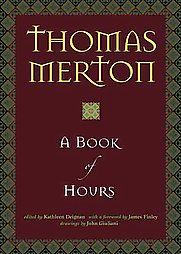The Way of a Pilgrim
 What does it mean to pray without ceasing?
What does it mean to pray without ceasing?
No, really. Specifically. In practice.
How do you pray without ceasing? Do you discuss every little decision you face during the day? Do you give God status updates every minute? Do you shut yourself away from human society altogether, and interact only with God?
This Orthodox classic puts forth a different way, one that rang strangely in my evangelical ears, but which inspires a whole new conception of what continuous prayer means.
The Way of a Pilgrim is written by a narrator whose name we never learn, walking through Russia and Siberia with a knapsack containing his Bible, dry bread, and the Philokalia. The manuscript was preserved by a monk and was first published in 1884. The pilgrim wants to understand how the unceasing prayer recommended in Scripture is possible. Early on, he meets a “starets,” or spiritual father, who explains to him the “Jesus prayer”: “Lord Jesus Christ have mercy on me.” The starets assigns him to say the prayer, mantra-like, 3,000 times a day. Then 6,000 times. Then 12,000 times. Then without limit.
This is a very different conception of prayer than I’m used to, one that doesn’t center around communicating with God about ideas, events, people or interior states. Eventually it becomes merely a habit, something most evangelicals (and Americans in general) would shun because it’s so not about inventing something fresh and individual. But this pilgrim experiences deep results spiritually.
I should point out that he practices the types of prayer more familiar to me as well, as when he recommends to a maiden fleeing an unwanted marriage that she would be better off praying earnestly for God to change her circumstances than running away. This isn’t a rejection of more… cognizant? conscious?… prayer. But it is an introduction of another kind, one that becomes a training of body, mind and heart. Eventually, the pilgrim speaks of his amazement that he can live with two consciousnesses, one continually in prayer, the other conducting the business of daily life.
One thing that initially bothered me was the pilgrim’s desire to be alone. The Great Commission being what it is, I think that even those of us with a monastic impulse to retreat into solitude need to challenge that by living our faith in community. But this didn’t end up bothering me for long, because this pilgrim is given many opportunities to interact and minister among people, despite the transient nature of his relationships.
I’m still processing the book in my thoughts. There are several things I appreciate and feel challenged by. One is the concreteness of its interpretation of unceasing prayer. Is it really possible to keep one part of your mind in prayer at all times — not just frequently, but continually? When I think about it, it seems quite likely that it is possible. I seldom give my whole mind to anything. There are always several lines of mental activity going on, for all of us — an amazing human capacity that our technologies can exploit with destructive results, turning our God-given complexity into mere distractibility.
Another thing I like about this book is its insistence on the primacy of prayer — a theme being developed in our church these days as we seek to become a “house of prayer,” and an exhortation that I always need to hear. There is a sequel to this book, The Pilgrim Continues His Way, which I will probably read as well. But I’m going to close this review with one example of the pilgrim’s words on prayer. The book is filled with gems, but this is one of my favorite passages:
My late starets of blessed memory also used to say that the forces which are against prayer in the heart attack us from two sides, from the left hand and from the right. That is to say, if the enemy cannot turn us from prayer by means of vain thoughts and sinful ideas, then he brings back into our minds good things we have been taught, and fills us with beautiful ideas, so that one way or another he may lure us away from prayer, which is a thing he cannot bear. It is called ‘a theft from the right-hand side,’ and in it the soul, putting aside its converse with God, turns to the satisfaction of converse with self or with created things. He taught me, therefore, not to admit during times of prayer even the most lofty of spiritual thoughts. And if I saw that in the course of the day, time had been spent more in improving thought and talk than in the actual hidden prayer of the heart, then I was to think of it as a loss of the sense of proportion, or a sign of spiritual greed. This is above all true, he said, in the case of beginners, for whom it is most needful that time given to prayer should be very much more than that taken up by other sides of the devout life.



9 Comments
Barbara H.
I wouldn’t have a problem with this kind of prayer because it’s not fresh and original, but I would think that saying something so many times it couldn’t help but become “vain repetition” Jesus warned against at least a great deal of that time. Of course, we’re not immune to that either — we can sometimes fall into rote, mindless prayers that were original at one point but become pattern after a while.
Ike
Barbara: On the other hand, the angels sing “Holy, holy, holy” without ceasing. And, as you rightly point out, Jesus warned us a great deal about _vain_ repitition. There is such a thing as repetition that is not vain. Anyways, God bless! :)
DebD
I’m glad you liked it, Janet. I loved the quote you shared. In another book I read I remember a monk talking about those distracting thoughts that come at us during prayer being like “bees buzzing around our head.”
Barbara – Something that is being repeated isn’t necessarily “vain” just because it’s being repeated. It is what is happening in our hearts that can be a problem.
Janet
You are the one who first mentioned this book to me, Deb — so, thank you!
A memory that came to me today as I was thinking about this was a scene from the movie ‘Amadeus’ where Mozart is composing something with one hand, and rolling a pool ball across the pool table with the other. It’s as though the repetitive action of his hand with the ball is keeping one potentially distracting part of his mind occupied while the other, the creative genius, is at work. What an act of consecration to devote even one part of the mind to God, deliberately, every moment. The words of the prayer are repetitive, but the ongoing commitment of repeating them does seem to be a deep act of worship.
I also have been thinking about the other mantras that are probably being repeated in my mind all the time, though they’re so familiar I’m not even aware of them — foundational precepts, many of them probably incorrect or sinful, but too familiar, too much a part of the landscape, to be discerned or dealt with. Introducing a continual line of conversation with God in that landscape opens up some amazing possibilities for the Holy Spirit to work.
H West
Hey, Janet! I read this book a while back and it is one I will have to read a few times in order to process it. One of the things I find when reading Orthodox books is that, even though I’ve been Orthodox for about 5 years, I still don’t completely understand the books in their context. When reading western ‘theology’, one can sort of ‘remove’ oneself from the particular ‘church’ or ‘denomination’ that the writer might be a part of. Eastern Orthodoxy plays by a completely different set of rules. That’s why interpretation can be a bit funny. You cannot separate an Orthodox Christian from his/her Church. I attended the Presbyterian church for most of my life. There were many times that people asked me about what church I went to and I said, ‘Well, I go to the Presbyterian church, but I’m not a Calvinist (I could NEVER swallow pre-destination).’ You hear that sort of thing all the time as a Protestant. Someone goes to such and such a church, but doesn’t subscribe to everything the church believes. That is a totally foreign idea to the Orthodox Christian and I’m just scratching the surface of what that means.
There is really no point to my statement in the way of ‘criticism’. It’s just to say that when we western thinkers approach an Orthodox book, we will most likely find things that ‘initially bother’ us (or some things that will always bother us). I enjoyed your commentary. Makes me want to pull that book out again!
And, I TOTALLY dig your header quote, ‘The world is made up of stories, not atoms.’ Did you make that up?!?!?!? Maybe I’m a total moron and some really famous person said it and I’m clueless! Wouldn’t be the first time!
Janet
I wish I’d made my tagline up, but Muriel Rukeyser did. I gave her credit in my sidebar (only because there wasn’t room in the header.)
Thanks for coming by!
Amy @ Hope Is the Word
My knowledge of Christian classics is lacking, but you have certainly given me food for thought. Have a lovely Sunday!
GretchenJoanna
I read the book before I was officially a catechumen, and last month I started reading it again, and it doesn’t seem to be any easier for me to “get,” several years later. I like to read the more modern books on the Jesus Prayer, also. But this one is definitely the classic.
Janet
Not being Orthodox, I knew a lot of this book would escape me. I’m separated by time, by doctrine, by tradition, by culture from its narrator. But if we’re both followers of Jesus, I felt, there should be some truth and challenge even for me to harvest. I found the pilgrim’s love for God and desire to make his life into a life of prayer inspiring. But there is too much missing in my sense of context to be at the point of “practicing the presence of God” in exactly this style.
I do come away from the book more aware of the way our minds can be busy on different levels, and I can choose to have worthy “food for thought” ready for all levels… all levels can be made into prayer. There are aspects of renewing and consecrating the mind that this book brought to my attention.